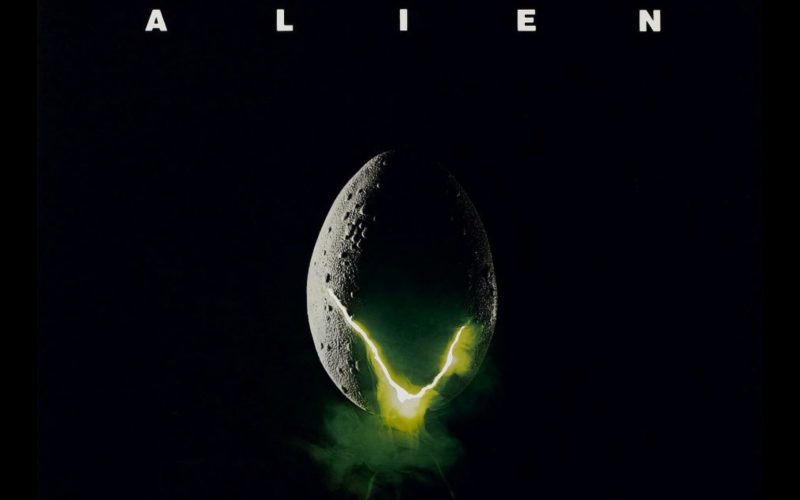Alien (1979).
“I admire its purity, a survivor…”
Director Ridley Scott has had a long and successful career, albeit not without its fair share of ups and downs. He’s been making films for well over four decades now and as the 40th anniversary of his first breakout success, Alien approaches, there’s no better time to take a look back at his seminal 1979 sci-fi classic.
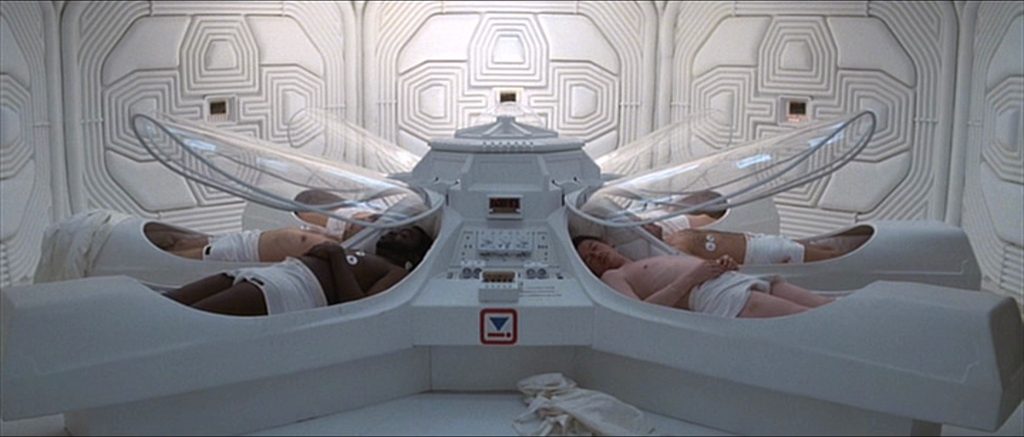
After the success of Star Wars in 1977, the landscape of cinema was changed forever. Whilst Jaws had set the trend for big summer blockbusters two years before it, Star Wars gave science fiction spectacle a degree of credibility that it hadn’t really had before, save for the odd exception such as Stanley Kubrick’s 2001: A Space Odyssey. Many directors that had yet to make their mark would be heavily influenced by George Lucas’ sweeping space opera. James Cameron for one has expressed how in awe he was of Star Wars and how much it had spurned him on to establish himself as a filmmaker. Many clones of Star Wars would follow and many filmmakers would try to emulate what Lucas did, often with mixed results. Ridley Scott would later state that Star Wars and 2001 were huge influences on Alien.
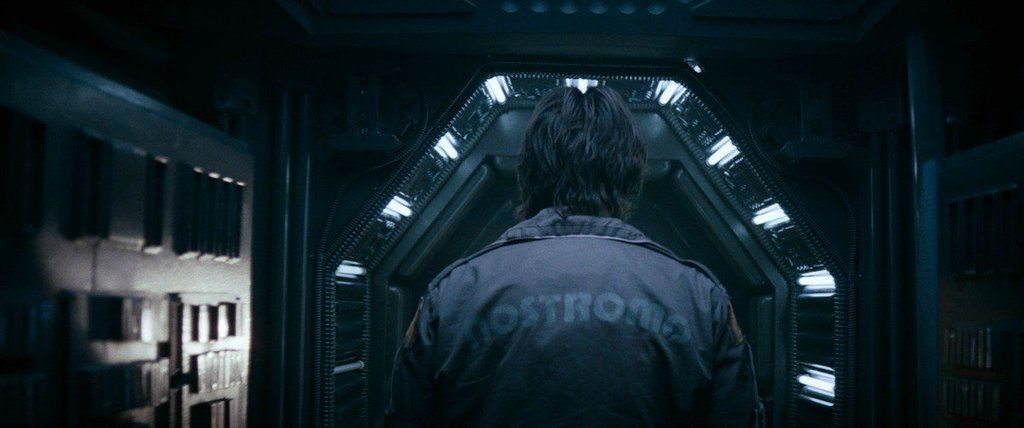
As we came to the end of the 1970’s, science fiction was now the big earner and studios were eager to jump on the bandwagon. Credit must be given to the studio that made Star Wars, 20th Century Fox, for bankrolling a science fiction film less than a year after Star Wars‘ success that was almost the complete opposite in style and tone to Lucas’ creation. More of a slow paced horror film in space than Star Wars‘ family friendly frenetic adventure, Alien would appeal to a far more mature audience. That said, Fox themselves passed on the film initially as did several other studios.
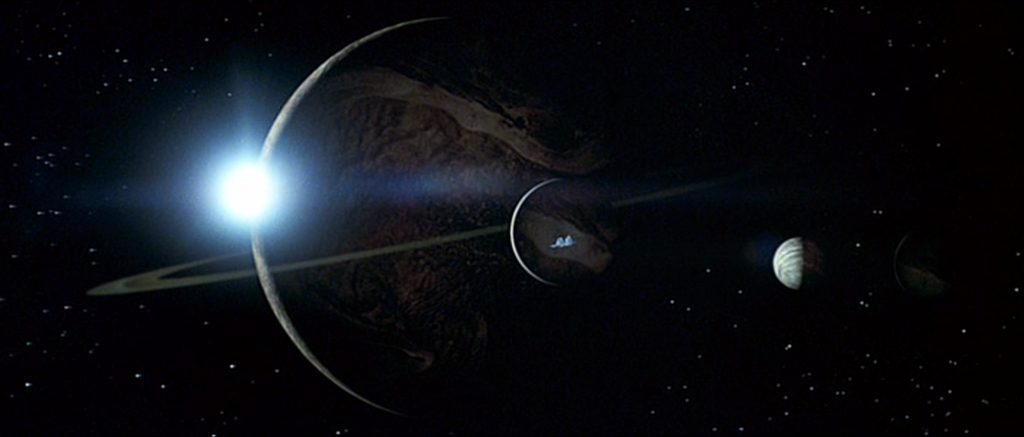
Based on an original idea and script by Dan O’Bannon and Ronald Shusett, Alien would undergo several rewrites by Walter Hill and David Giler who would change all of O’Bannon and Shusett’s character’s names and also add the character of Ash who was absent from the original version. It was the involvement of Walter Hill that finally made Fox executives agree to take on the project and they chose Ridley Scott as director. Scott has always relied heavily on storyboards in pre-production and when Fox saw his Ridleygrams – as Scott likes to call them – and how strongly he was able to convey his vision of the film he wanted to make in those storyboards, Fox doubled the budget from $4.2 to $8.4 million.
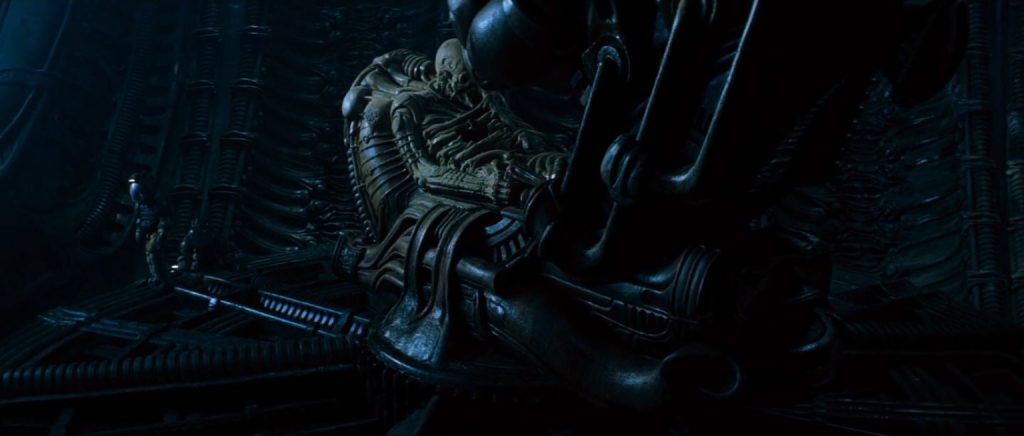
From the opening titles, Alien sets it’s stall out early on. It’s all about creating atmosphere, and later on a palpable tension, and taking its time to do so. The camera slowly but patiently pans horizontally across the image of an unknown, distant planet, the brooding and malevolent tones of Jerry Goldsmith’s beautiful score perfectly complementing the visuals, all while the slow yet stunningly simple reveal of the film’s title happens at the top of the frame. This is visual filmmaking of the kind Scott excels at. This then moves into even more stunning scene setting in the vast corridors of the space tug Nostromo, it’s job to haul through space an even bigger mineral ore mining vessel that makes the tug look tiny in comparison. The time Scott takes in these establishing shots at one time frustrated me, as did the often languid pace of the film and from my own personal perspective there’s a reason for that which I’ll come to later. Now though, I fully appreciate the efforts he made to reinforce the feelings of loneliness and isolation that the Nostromo’s crew of a meagre seven are facing in the vast depths of space.
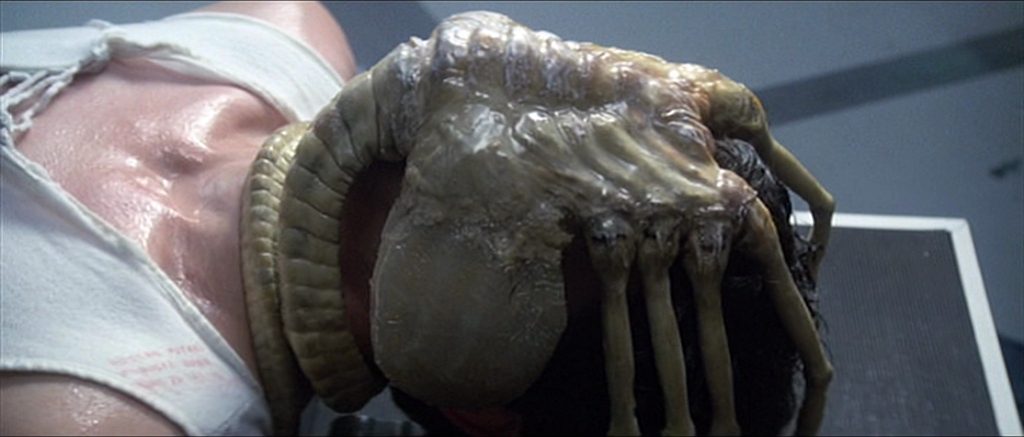
Said crew is awoken from hyper-sleep after the ship’s computer, known as Mother, picks up a “transmission of unknown origin” as Captain Dallas (Tom Skerritt) explains to the crew, with some input from Science Officer Ash (a remarkably jittery Ian Holm), that they’re contractually obligated to explore any transmissions that may be evidence of extraterrestrial life. It’s here that we first see something that, for me, sets Alien head and shoulders above other similar films and that’s the outstanding quality of its small cast. It’s not just the relaxed sense of familiarity that some of them share, they really do convince that they’ve spent months or longer in each other’s company. More so than this is how utterly convincing each actor is in their respective role. The performances are enhanced by little moments of probable ad-libbing such as when Parker (Yaphet Kotto) wipes the chair he’s about to sit in after Ash vacates it. It’s a small addition but one that speaks volumes of his attitude towards the science officer.
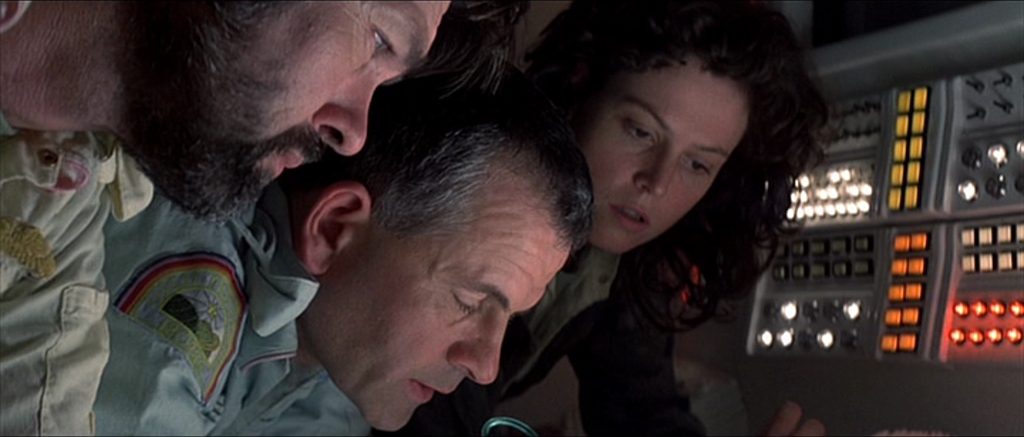
There is a very tangible class divide amongst this small crew. At the bottom of the hierarchy, literally and figuratively given their home in the bowels of the ship, are engineers Parker and Brett (Harry Dean Stanton). These two civilians are money driven and are often at odds with the officers that command the mission, especially Warrant Officer Ripley (Sigourney Weaver) with whom they banter playfully but with a sharp edge undercutting the dynamic of their relationship. Parker especially, often struggles to hide his disdain for what he sees as the elitist officers and the tension between the crew is palpable even before the terror starts. I’ve always picked up on a subtle undercurrent that there’s something going on in the dynamic between Dallas, Ripley and Lambert (Veronica Cartwright). We are given nothing more than a certain tension but it alludes to a history between them that wholly convinces that these are real people and it shows the time and effort that was put in by the writers and cast to fully flesh out the characters.
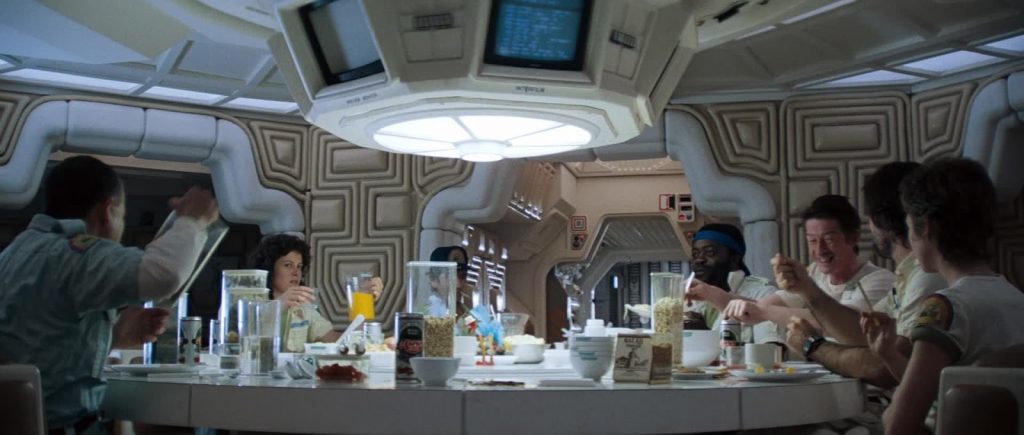
This one aspect of Alien, the meticulously crafted depth of character, may be the main defining quality that marks it out as a true classic, even more so than the stunning visuals. The whole grimy, lived-in look of the sets coupled with the hyper-realistic yet workmanlike approach the actors took gives Alien a feeling more akin to truckers in space than many of the stoic, stuffy and sterile space-based science-fiction films that have come before or since.
When our crew get to the source of the transmission, the small planetoid LV-426, we see more jaw-dropping visuals and some phenomenal set design. The work of H.R. Giger and conceptual artist Jean ‘Moëbius’ Giraud has been discussed at great length but cannot be taken for granted. The disturbingly unfamiliar architecture of the crashed alien vessel wowed audiences in 1979 as, prior to Alien, nothing like it had been seen in a film before. The now famous fate of Kane (John Hurt), both when the facehugger bursts out of the egg and attaches itself to him, and the subsequent “birth” of the titular creature in that truly iconic last supper scene, are the things of nightmares, playing on the subconscious fear of rape and emasculation within male members of the film’s audience.
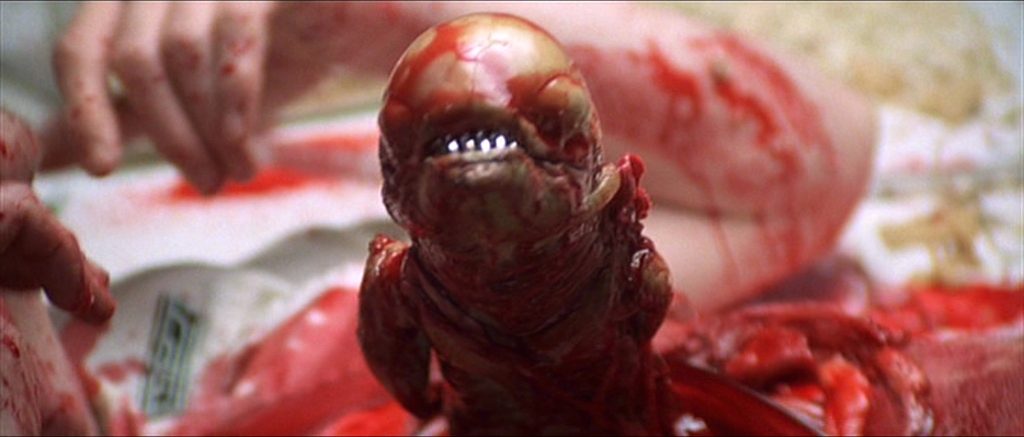
What‘s so remarkable about the film’s most famous scene is how subtly Scott focuses on Ash prior to the famous chest-bursting reveal. Ash knows something bad is probably going to happen, he doesn’t know what and probably couldn’t stop it anyway, but his cold, callous curiosity is clearly apparent as he studies Kane across the dinner table. Yet when the big moment comes, Ash looks every bit as horrified as the rest of the crew, so shocking and visceral was the execution of the scene. That said there’s so much going on in his performance that his expression could easily be read as being one of fascination as much as horror. Ian Holm gives a career best performance in a film full of outstanding performances.
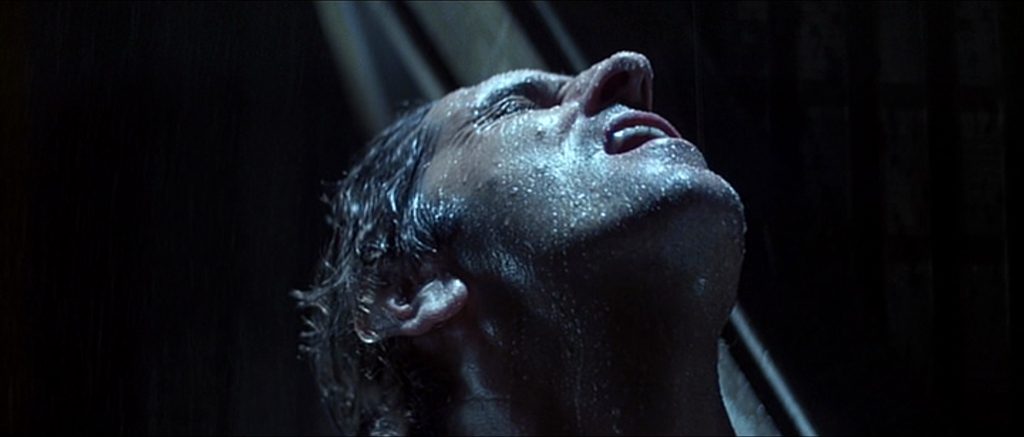
The Alien itself is a marvel of iconic creature design by Giger and would prove to be the definitive cinematic representation of a hostile extraterrestrial. It’s life cycle from egg to face-hugger to chest-burster to fully formed, acid-blooded Xenomorph was superbly conceived and ensured that the level of threat was maintained throughout as we witness each stage of the Alien’s transformation. It really is a creature unlike anything we can relate to on Earth and something only a twisted visionary like Giger could construct.
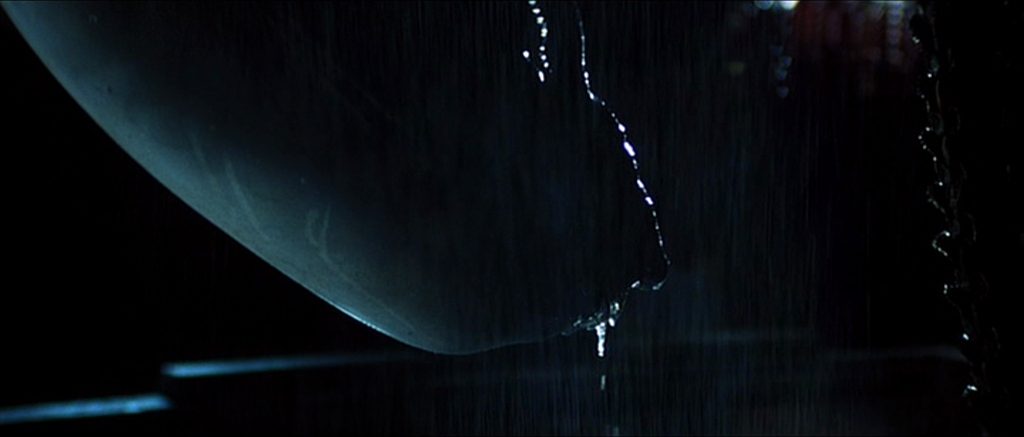
Music is used somewhat sparingly throughout but that’s not to deprive legendary composer Jerry Goldsmith of the credit he deserves. His score for Alien is, at times, one of the most restrained yet beautifully unique scores and he uses percussion like a sound effect in order to enhance the terror on screen.
Special mention must be made of Alien‘s production design by Michael Seymour and the hugely talented art department. Every facet of the physical design of Alien from the vast sets to the costumes to the individual props is simply phenomenal and adds to the grungy truckers in space feel. The ‘Space Jockey’ chamber is a great example of where Giger’s vision was perfectly converted into something tangible, something alien and something we’ve simply never seen before.
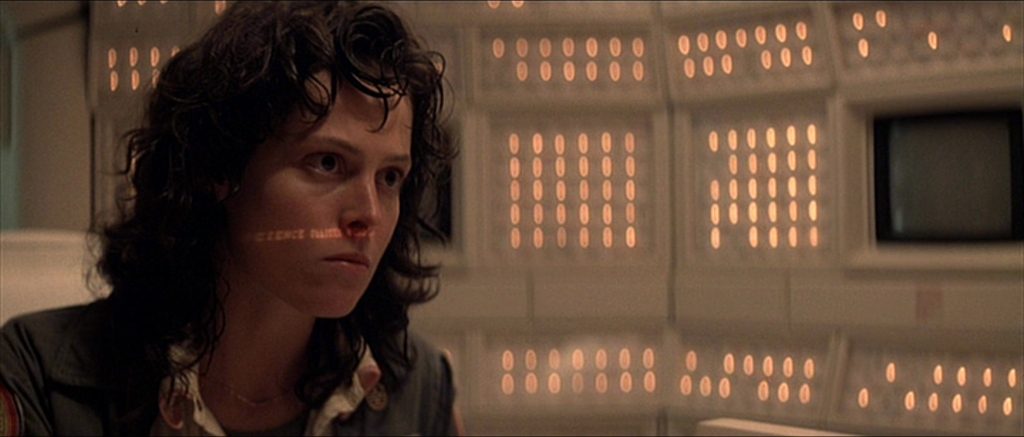
Once the creature is let loose on the ship and our crew are picked off one by one, the previously established conventions of a lone surviving male hero are rightly subverted. Following the painfully tense build up to Captain Dallas’ demise it is Ripley who steps up to the plate and ultimately outwits the creature. Sigourney Weaver doesn’t dominate the film, this is very much an ensemble piece, but she certainly puts in a performance that is every bit the equal of her peers. In fact, all the characters in O’Bannon and Shusett’s original treatment were non-gender specific and they were written such that they could have been played by a male or female actor. Thank the stars then that Ripley was cast as a woman otherwise we may have been deprived of one of cinema’s greatest female icons.
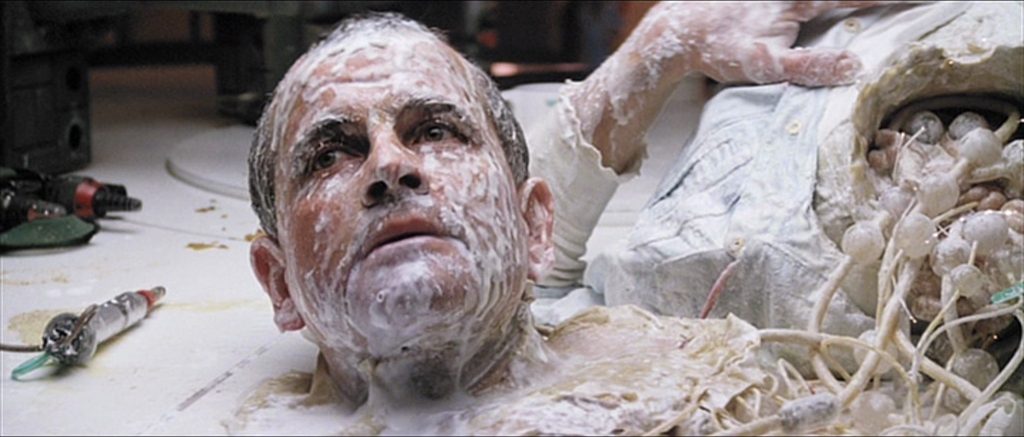
In 2003, at the request of Fox, Ridley Scott was tasked with creating a new cut of Alien. This wasn’t because he personally felt that the theatrical cut had issues that he needed to address and it’s still his preferred version. Scott has stated that this “Director’s Cut” should be seen more as an alternate cut, a gift to fans who had long wanted to see the rumoured deleted footage, some of which is incorporated into the new cut. Some edits were made elsewhere and the new cut actually ends up being a minute shorter than the theatrical cut. Some of the additional expositional dialogue does add to the film although to no real degree that diminishes the original version. It’s most significant addition is in the finale where Ripley finds the cocooned body of Brett and the still barely alive Dallas, whom she then incinerates as an act of mercy. Brett seems to be being transformed into one of the eggs that Kane had found on LV-426 and this extra bit of information of the creature’s life cycle would certainly contradict what would later be established in the sequels. It’s exactly as Scott intended, an alternate cut for fans but not to be taken as his final and preferred version of the film.
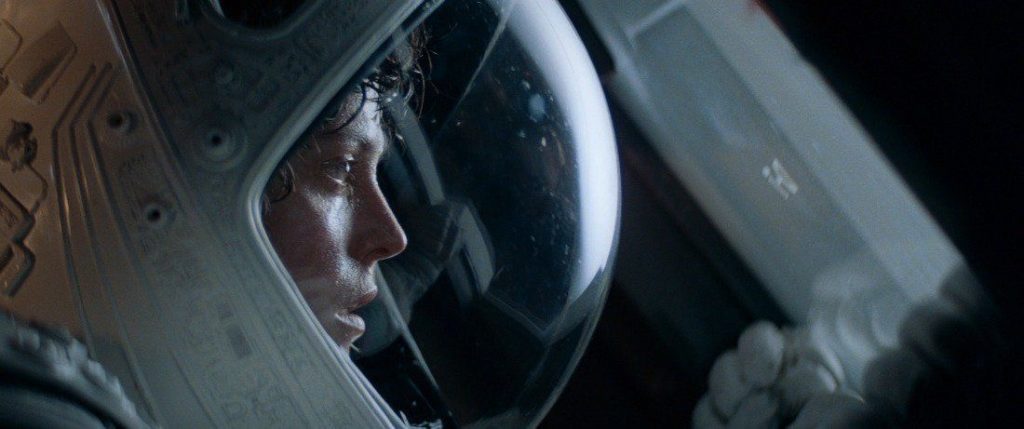
That title, Alien, so ingrained in popular culture, so perfectly innocuous in its simplicity yet wholly fitting coupled with that now iconic poster image of the Alien egg gives little away yet conveys so much. It’s the very definition of effective, minimalist marketing. The addition of the tagline, “In space no one can hear you scream” makes it clear exactly what sort of a ride we’re in for.
Earlier I mentioned the personal frustrations I once had with certain aspects of Alien, namely the often languid pace and that’s purely down to the fact that I was far too young to ever have seen Alien in the cinema, the same goes for its sequel, Aliens. Yet it was James Cameron’s balls-to-the-wall follow-up that was my introduction to this saga and Aliens absolutely blew me away. To this day it’s one of my favourite films and therefore, having seen it before I saw Alien, I was never able to view the first film afresh and would always compare it to the sequel. Now I won’t argue which is the better film. I’ve tried to do that before with The Terminator and T2 and I can never definitively state with any confidence that one is better than the other. Like the first two Terminator films, Alien and Aliens perfectly complement one another and it’s fitting that they are tonally different yet very much part of the same story and set in the same continuity. In my youth I simply didn’t have the patience to fully appreciate Alien, but as a seasoned film lover I now see with clarity the stunning achievement that Ridley Scott and the entire cast and crew created.
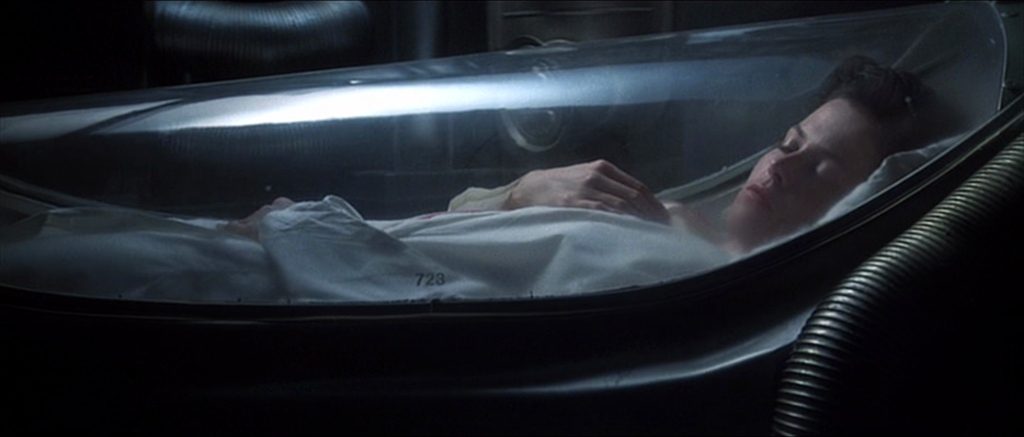
Alien is many things, an efficient and effective horror film, a thoroughly engaging piece of science fiction, a masterclass in visual storytelling, a flawlessly acted ensemble pice and a classic of modern cinema.
This is Skye Wingfield, writer for Film ‘89, signing off.
Film ‘89 Verdict – 10/10
A new 4K remaster of Alien is currently on limited theatrical release in selected cinemas.

